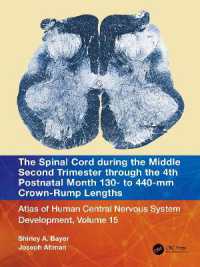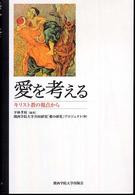Full Description
Conversations related to epistemology and methodology have been present in comparative and international education (CIE) since the field's inception. How CIE phenomena are studied, the questions asked, the tools used, and ideas about knowledge and reality that they reflect, shape the nature of the knowledge produced, the valuing of that knowledge, and the implications for practice in diverse societies. This book is part of a growing conversation in which the ways that standardized practices in CIE research have functioned to reproduce problematic hierarchies, silences and exclusions of diverse peoples, societies, knowledges, and realities. Argued is that there must be recognition and understanding of the negative consequences of hegemonic onto-epistemologies and methodologies in CIE, dominantly sourced in European social science traditions, that continue to shape and influence the design, implementation and dissemination/application of CIE research knowledge. Yet, while critical reflection is necessary, it alone is insufficient to realize the transformative change called for: as students, researchers, practitioners and policymakers, we must hear and heed calls for concrete action to challenge, resist and transform the status quo in the field and work to further realize a more ethical and inclusive CIE.
Interrogating and Innovating Comparative and International Research presents a series of conceptual and empirically-based essays that critically explore and problematize the dominance of Eurocentric epistemological and methodological traditions in CIE research. As an action-oriented volume, the contributions do not end with critique, rather suggestions are made and orientations modelled from different perspectives about the possibilities for change in CIE.
Contributors are: Emily Anderson, Supriya Baily, Gerardo L. Blanco, Alisha Braun, Erik Jon Byker, Meagan Call-Cummings, Brendan J. DeCoster, D. Brent Edwards Jr., Sothy Eng, Ameena Ghaffar-Kucher, Jeremy Gombin-Sperling, Kelly Grace, Radhika Iyengar, Huma Kidwai, Lê Minh Hằng, Caroline Manion, Patricia S. Parker, Leigh Patel, Timothy D. Reedy, Karen Ross, Betsy Scotto-Lavino, Payal P. Shah, Derrick Tu, and Matthew A. Witenstein.
Contents
Foreword
Halla B. Holmarsdottir
Preface
Acknowledgements
About the Cover
List of Figures and Tables
List of Acronyms
Notes on Contributors
1 Interrogating and Innovating CIE Research: Setting the Stage
Meagan Call-Cummings, Caroline Manion and Payal P. Shah
PART 1: Interrogating and Innovating CIE Research
2 Onto-Epistemological Frontiers in CIE Research: Exploring the Problematic
Caroline Manion
3 Before Reconciliation, There Must Be Truth
Leigh Patel
4 Beauty and Comparative Education Research Methods: A Consideration for Aesthetic Cognitivism
Derrick Tu
5 Interrogating Impact: Whose Knowledge Counts in Assessment of Comparative and International Education Interventions?
Karen Ross
PART 2: Decolonizing Methodology by Invoking Local Voices
6 Decolonializing Voice and Localizing Method in Comparative Education
Gerardo L. Blanco
7 Amplifying Indian Women's Voices and Experiences to Advance Their Access to Technical and Vocational Education Training
Radhika Iyengar and Matthew A. Witenstein
8 Contemporary Traditions of State-Madrassa Relationships in India
Huma Kidwai
9 'I Walk Each Village': Transforming Knowledge through Citizen-Led Assessments
Erik Jon Byker
PART 3: Destabilizing Power and Authority: Taking Intersectionality Seriously
10 Destabilizing Power and Authority: Taking Intersectionality Seriously
Payal P. Shah and Emily Anderson
11 Notes on Intersectionality and Decolonizing Knowledge Production
Patricia S. Parker
12 Knowledge Hierarchies and Interviewing Methods in Cambodia: Strategies for Collaborative Interpretation
Kelly Grace and Sothy Eng
13 Amplifying the Voices of People with Disabilities in Comparative and International Education Research with PhotoVoice Methodology
Alisha M. Braun
PART 4: Implications for Methodology: Towards More Equitable Futures
14 Implications for Methodology: Towards More Equitable Futures
Supriya Baily, Betsy M. Scotto-Lavino and Meagan Call-Cummings
15 CIE Methodology and Possibilities of Other Futures
Ameena Ghaffar-Kucher
16 The "Significance" of Epistemicide: Unpacking the Problematic Statistical Foundations of Knowledge Production in Global Education Governance
D. Brent Edwards Jr.
17 Continuing the Conversation: Towards a Model of Collective Critical Reflection in CIE Research
Lê Minh H.ng, Brendan Decoster, Jeremy R. Gombin-Sperling and Timothy D. Reedy
18 New Directions for Consideration: Looking Forward and Ahead
Emily Anderson, Supriya Baily, Radhika Iyengar and Matthew A. Witenstein
Index







